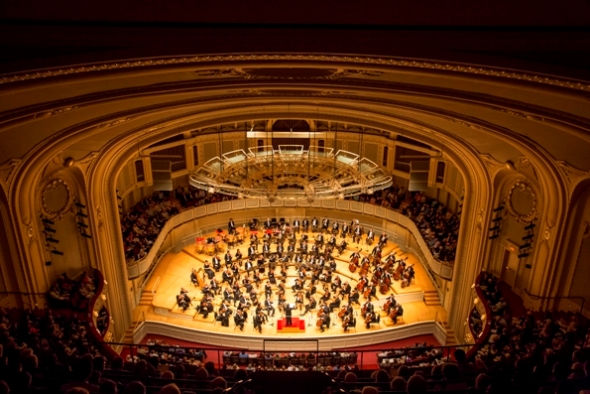While the band played on, Chicago Symphony and its musicians hammered out a three-season deal
Update: It’s a deal. The Chicago Symphony Orchestra and its musicians are good to go for three years.
By Nancy Malitz
The musicians of the Chicago Symphony Orchestra and the Chicago Symphony Orchestra Association announced Sept. 29 the ratification of a new three-year collective bargaining agreement, effective Sept. 14, 2015, through Sept. 16, 2018. The musicians had been rehearsing and performing without a contract since Sept. 15.
Under the new terms, CSO musicians’ annual salary will increase by 1% in the first contract year and 2% in each of the second and third years. Base pay for musicians of the Chicago Symphony will be $159,016 by the end of the 2017-18 season, solidly in the upper echelon of American orchestras.
Although musicians in mid-size orchestras have been forced to accept drastic pay cuts as their cities struggled in the 2008-2009 recession, with the Detroit, Minnesota and Atlanta orchestras particularly affected, the salaries of musicians in the nation’s top echelon orchestras have shown greater stability, with base salaries in the $150,000 bracket. Base annual pay for musicians of the Los Angeles Philharmonic, for example, will be $154,336 by the end of the 2016-17 season. Both Los Angeles and Chicago will be edged out by the San Francisco Symphony, which is currently at $150,384 but will rise to $166,400 by the end of the 2017-18 season.
However, pension and health care issues are equally contentious issues of negotiation at all orchestras, and it is not uncommon for one component to edge ahead of another in the context of the continually overlapping contract expiration dates as orchestras around the country come to terms. Back in 2012, Chicago Symphony musicians achieved no pension benefit increases, an issue that became a focus as the negotiations stretched toward 12 weeks this time around. The pension benefit increase is now scheduled at 4.3 percent, while the health care package remains unchanged. Some scheduling provisions will provide more flexibility during the season and on tour.
A mediator from the Federal Mediation and Conciliation Service, Javier Ramirez, assisted the parties in the final stages of negotiations.
“The city of Chicago is so very fortunate to be the home of one of the world’s great orchestras,” said Jay Henderson, chairman of the CSOA’s Board of Trustees. “The musicians’ dedication to performing at the highest artistic level makes the Chicago Symphony Orchestra an exceptional ensemble. This new agreement recognizes the preeminence of our orchestra while ensuring long-term financial sustainability, and we appreciate the musicians’ willingness to work constructively in this process.”
“I have the greatest admiration for the musicians of the Chicago Symphony Orchestra and am pleased we have come to an agreement on a new contract,” said Jeff Alexander, president of the CSOA. “The orchestra serves the greater Chicago community and the world with extraordinary performances, recordings, broadcasts and educational activities. It is an honor to be part of this distinguished institution, and to work on a daily basis with the members of the CSO. I look forward to continuing to work together to advance the activities of this great orchestra.”
“The musicians of the Chicago Symphony Orchestra are pleased that an agreement for a new contract with the Association has been reached,” said Stephen Lester, chairman of the CSO Members Committee. “We are optimistic that this agreement will lay a foundation for dynamic growth and continued success into the future.”
“For many decades, the CFM and CSOA have had a productive relationship,” commented Gary Matts, president of the Chicago Federation of Musicians, the musicians’ union, which is Local 10-208 of the American Federation of Musicians. “The parties have always worked diligently to reach contract agreements reflecting the status of the CSO as one of the world’s great orchestras.”
The negotiations last time around, in 2012, were less successful, leading to a sudden three-day strike in a contentious climate. Talks broke down after the season was underway over wages and employee contributions to health care costs. The strike, which was the first in more than two decades, was quickly settled. A 1991 Chicago Symphony dispute lasted two weeks and delayed the official debut of Daniel Barenboim as the new music director.
Tags: Chicago Federation of Musicians, Chicago Symphony Orchestra, labor contract, Los Angeles Philharmonic, orchestra salaries, San Francisco Symphony


